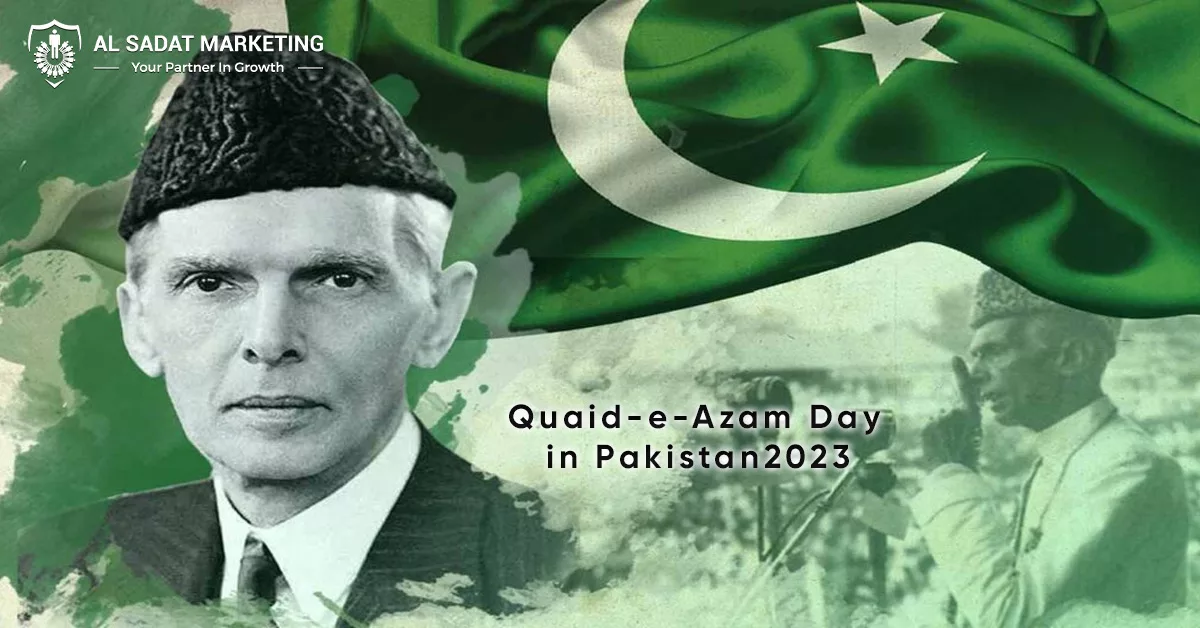Introduction to Quaid-e-Azam Day 2023
Pakistan observes Quaid-e-Azam Day 2023 on December 25 of each year. People celebrate the birthday of Muhammad Ali Jinnah. Qaid-e-Azam, which translates to “Great Leader,” was the name given to him and was considered to be the country’s founder. There are several activities across the nation on this significant national holiday. On August 14, 1947, Jinnah was appointed Governor-general of Pakistan. He put a lot of effort into organizing a nation riven by intercommunal warfare and putting up a government. He passed away in his Karachi residence one year after being named Pakistan’s governor-general. His contributions to the nation have made him one of Pakistan’s finest presidents.
History of Quaid-e-Azam Day 2023
As the first governor-general and the founding father of Pakistan, Muhammad Ali Jinnah is highly esteemed there. The man known as Quaid-e-Azam Jinnah had a great deal of work ahead of him.
He was in charge of establishing a government and providing care for thousands of Indian immigrants. Muhammad Ali Jinnah seized power and established a new, unstable nation. He was also diagnosed with TB at the time. Just one year after taking office as governor-general on September 11, 1948, he passed away, having fought hard to see that Pakistan had some sort of government.
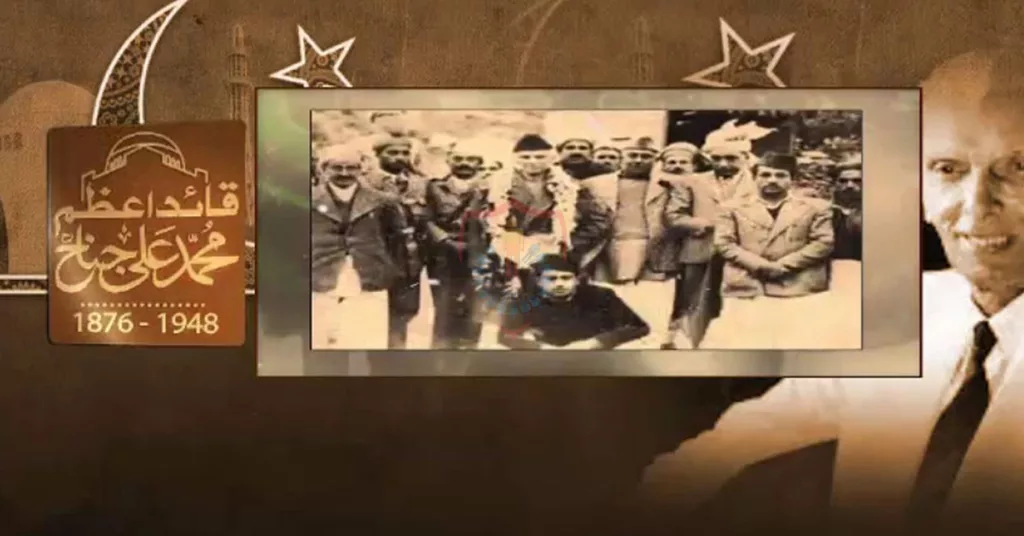
Muhammad Ali Jinnah was a qualified lawyer with a professional career before becoming governor-general. He was an essential participant in the Indian subcontinent’s movement for independence from British rule and a leading member of the Indian National Congress.
By 1940, Jinnah concluded that in order to prevent Muslims from being marginalized in the recently established state of India, a distinct Muslim State was required. He put up a courageous struggle to secure the formation of Pakistan, and the nation’s citizens celebrate his victory tremendously.
Read More: Jinnah Day Officially Declared as Public Holiday
Read More: Christmas Day 2023
Quaid-e-Azam Day 2023 is celebrated on December 25 in honor of the esteemed leader. Pakistan celebrates this day in a variety of ways. Professional ceremonies are also a part of the public holiday, and both governmental and non-governmental structures particularly hoist the national flag on Quaid-e-Azam Day 2023.
Quaid e Azam Day 2023 Timeline
1876:
The Birth of Muhammad Ali Jinnah
Born in Karachi’s Wazir house, Muhammad Ali Jinnah later pursued his legal education in England.
1913:
The Birth of Muhammad Ali Jinnah
Born in Karachi’s Wazir house, Muhammad Ali Jinnah later pursued his legal education in England.
1947:
Pakistan is Established as a Nation
Quaid-e-Azam Jinnah became the country’s first governor general when Pakistan was created.
1948:
Death of Muhammad Ali Jinnah
On September 11, 1948, Jinnah passed away from TB after a protracted illness.
An important turning point in South Asia’s history was the establishment of Pakistan in 1947. The aspiration for a distinct state for Muslims and the fight for freedom from British colonial control gave rise to the new nation. As Quaid-e-Azam (the Great Leader), Muhammad Ali Jinnah was leading from the front in the fight for freedom.
Examine the life and contributions of Quaid-e-Azam and consider how important he was to the creation of Pakistan.
Birth to Adulthood and Schooling
On December 25, 1876, Muhammad Ali Jinnah was born in Karachi, which was a part of British India at the time. He came from a wealthy Gujarati family and attended the Sindh Madrasatul-Islam for his early schooling before relocating to London to pursue his education.
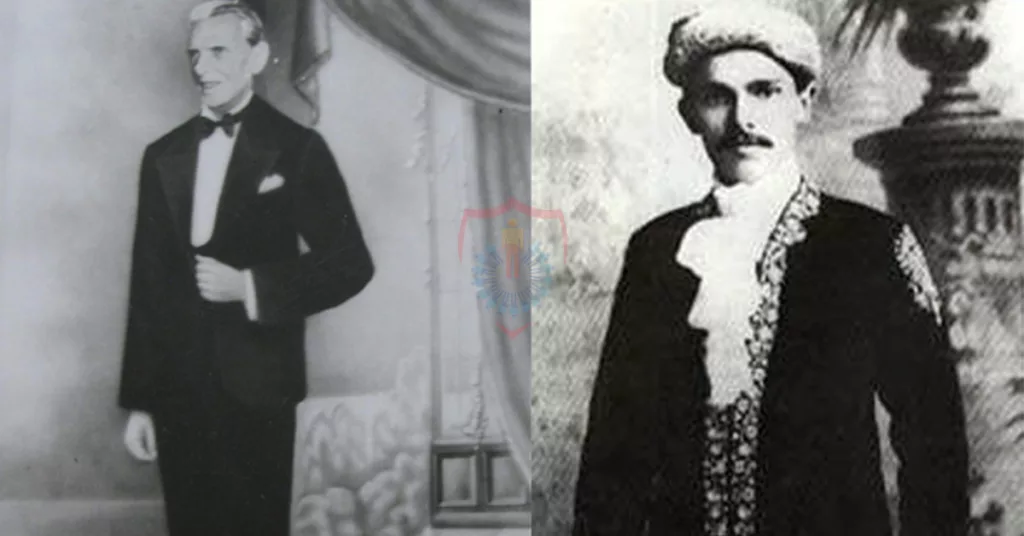
Jinnah’s endless interest drove him to pursue a legal education in London, where he polished his abilities and gained an extensive knowledge of the law. Jinnah’s career as a lawyer and, subsequently, as a well-known political figure were greatly influenced by his education.
Jinnah’s dedication to learning and personal development eventually proved to be vital in the establishment of Pakistan, the country he guided to independence in 1947. His early schooling demonstrated his commitment to learning and established the foundation for his significant contributions.
A Political Awakening
After a slow and profound awakening to politics, Muhammad Ali Jinnah went on to play a crucial role as the head of the All-India Muslim League and the principal planner of India’s 1947 division.
Jinnah first began practicing law in London, where he met prominent Indian nationalists like Mohandas Karamchand Gandhi and joined the Indian National Congress. His differences with Congress forced him to reevaluate his political strategy, particularly in light of the concerns raised by the Muslim community.
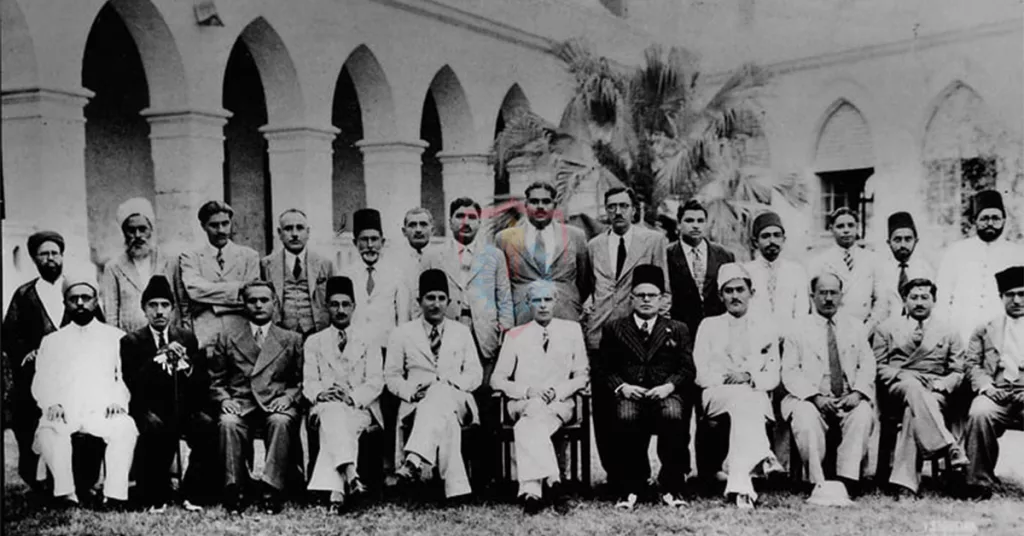
The Congress and the Muslim League came to an accord during the Lucknow Conference of Congress in 1916. A pivotal moment in Jinnah’s political awakening was the agreement. His perspective underwent a significant shift when he realized how critical it was to protect Muslim rights in the context of Indian politics.
Jinnah became a powerful voice for Muslim rights in the decades that followed.
In the following decades, Jinnah became a powerful voice for Muslim rights. He was devoting his entire career to defending the political, social, and financial rights of Muslims worldwide. His key “Fourteen Points” from 1929 outlined the requests for constitutional protections made by the Muslim League.
As the calls for an independent state with a majority of Muslims increased, Jinnah’s ability to lead and negotiate gained prominence. Pakistan was established in 1947 as a result of his steadfast dedication to the concept of Pakistan as a Muslim nation.
The Call for an Independent Muslim State
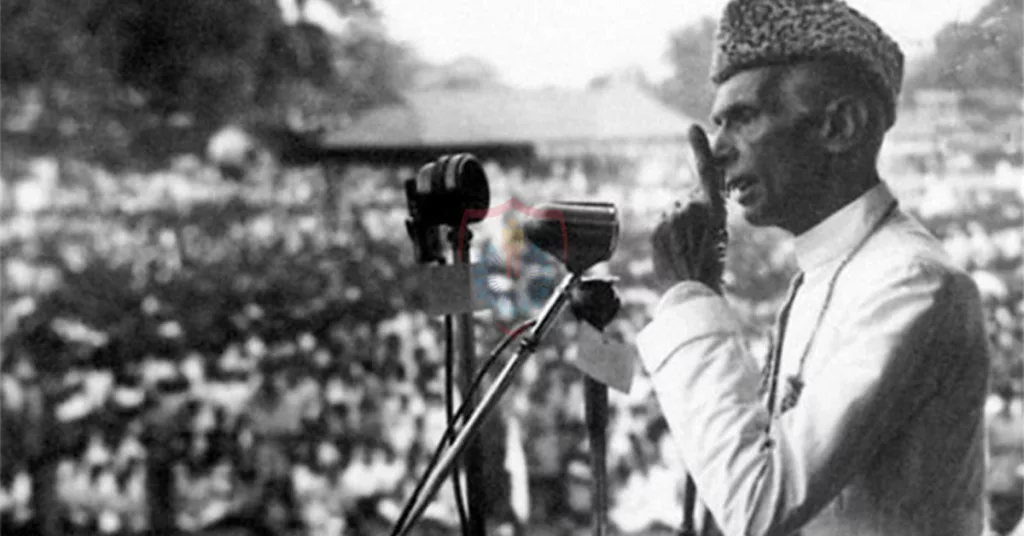
Muhammad Ali Jinnah was convinced that Muslims in India required an identifiable homeland to protect their social, economic, and political rights, which led him to urge the creation of a separate Muslim state.
As the head of the All-India Muslim League, Jinnah held the view that Muslims and Hindus belonged to two distinct countries with intractable divisions. He predicted that Muslims would become marginalized in a unified India. By calling for the establishment of an independent Muslim state in the Lahore Resolution of 1940, he brought attention to this issue.
Let’s examine some of the key justifications for the need for a distinct Muslim state.
1. Growing Discontent
Jinnah and other Muslim leaders were at odds with Hindu leaders who opposed the notion of Muslims having their own nation. Although Jinnah made an effort to talk about these problems in his many speeches, the Muslim community had many more worries about civil and human rights violations.
That was the start of a fresh, unstoppable wave of divergences that gave rise to the concept of an independent Muslim state.
2. The Pact of Lucknow
Jinnah was a key player in the 1916 Lucknow Pact, a historic accord between the Congress and the All India Muslim League. The agreement intended to provide a political voice for both the Muslim and Hindu groups and to close the distinction between them. During this formative period of his political career, Jinnah’s ability to negotiate and his dedication to minority rights were prominent.
3-The Two-Nation Theory
Over time, Jinnah’s vision for India changed. He started to feel that Muslims required their own country in order to safeguard their rights and beliefs and that Hindus and Muslims belonged to two distinct nations. This idea served as the basis for the Two-Nation Theory, which is an essential Pakistani ideological requirement.
The All India Muslim League’s leadership
The direction of Indian history was significantly influenced by Muhammad Ali Jinnah’s leadership of the All-India Muslim League. The party was established in 1906 with the intention of defending Indian Muslim rights. This campaign became a compelling story because of the Muslim League’s dynamic and forward-thinking leadership.
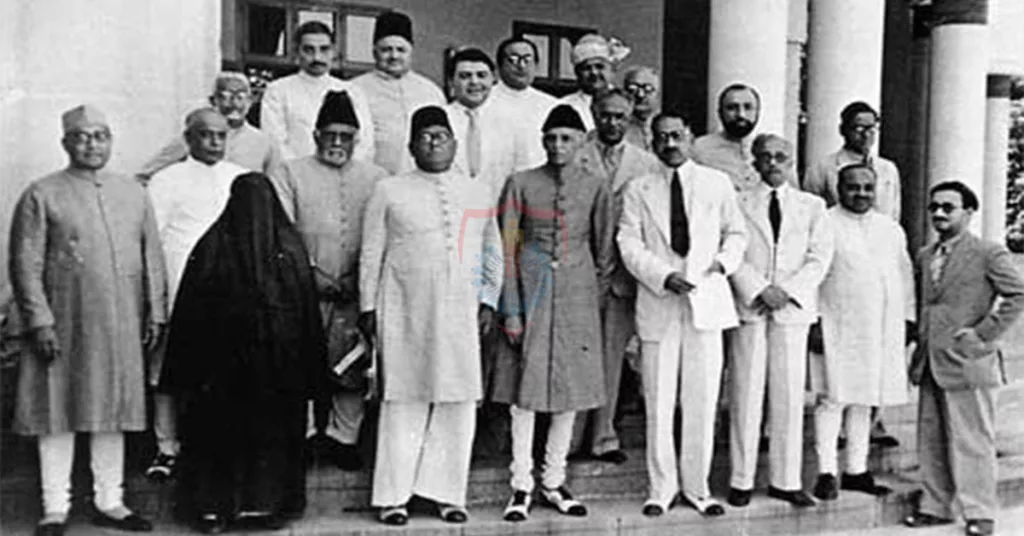
Jinnah’s ability to strategize and negotiate was crucial in uniting Muslims in support of the Pakistani claim. Other Muslim League officials, including Jinnah, also made every effort to support the Muslim community.
1. The Muslim League’s president
Jinnah became the All India Muslim League’s president in 1934 and remained in that role until 1947 when Pakistan was established. He turned the Muslim League, which supported the formation of Pakistan, from a small and politically insignificant organization into a powerful one.
2. The Resolution of Lahore
On March 23, 1940, the Lahore Resolution was adopted at the Muslim League’s annual assembly. In places where Muslims predominate, the Lahore resolution unequivocally advocated for the creation of an autonomous Muslim state. It was made possible by Jinnah and other leaders, and the resolution is still a pillar of Pakistani history.
The Negotiations and Independence Struggles of Jinnah
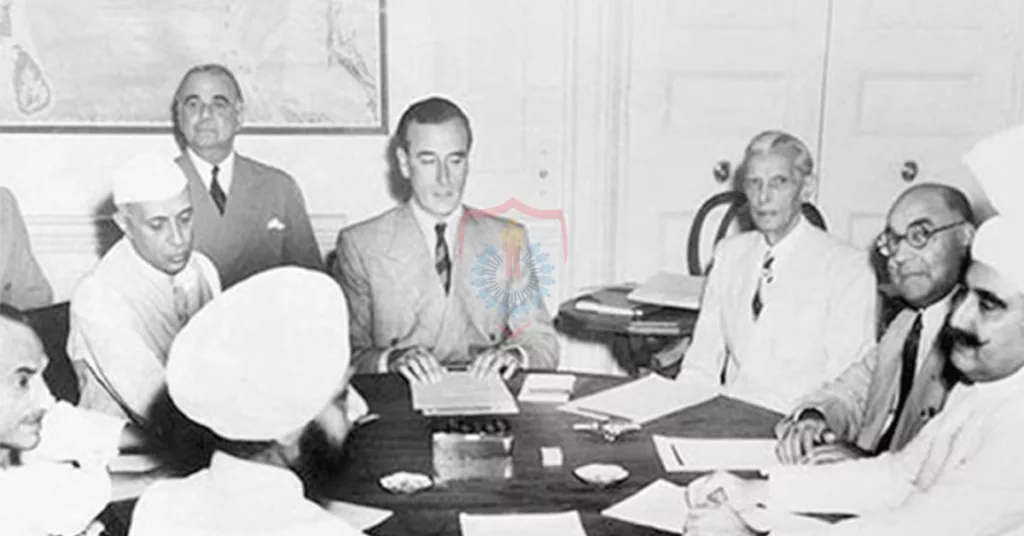
Future plans for India became increasingly discussed as World War II drew to a close.
In the meantime, there were conflicts between Muslims and Hindus, and tensions in the area started to rise. The Muslim League’s leadership saw this as a chance to begin constructing their story through discussions and negotiations with British authorities.
1. The Mission Plan of the Cabinet
A federal government with considerable provincial autonomy was suggested for India in the British Cabinet Mission Plan of 1946. Jinnah was first dubious about this proposal, but he saw it as a first step toward the establishment of Pakistan. Jinnah eventually consented to take part in the provisional administration established by this scheme.
2. Day of Direct Action
On August 16, 1946, Hindu-Muslim tensions in Kolkata reached a breaking point, sparking a bloody outburst known as Direct Action Day, or the 1946 killings day.
The Muslim League’s leadership declared a statewide strike aimed at Congress and demanded that all businesses close. This demonstration resulted in the deaths of numerous Muslim and All-India Muslim League employees.
This episode reinforced Jinnah’s belief that Muslims need to have their own nation and brought attention to the widening gap between societies.
3. Self-reliance and division
On August 14–15, 1947, as the British were getting ready to leave India, talks between the Muslim League, the Indian National Congress, and other groups resulted in the creation of two independent countries: Pakistan and India. Jinnah was the first Governor-General of Pakistan, a post he retained until his passing on September 11, 1948.
Conclusion
To sum up, Quaid-e-Azam Muhammad Ali Jinnah was a major contributor to the founding of Pakistan. The realization of the goal of an autonomous Muslim state was made possible by his negotiation abilities, leadership, and uncompromising adherence to the Two-Nation Theory.
As Pakistan’s founding father, Jinnah has left a lasting legacy that is still honored in the country’s politics and morals. The account of Jinnah’s contribution to the founding of Pakistan is proof of the strength of inspirational leadership and the will to uphold the hopes and rights of a group that has been marginalized.
FAQs
Q1: When is the Quaid-e-Azam Day 2023?
Quaid-e-Azam Day 2023 is observed as a public holiday in honor of Muhammad Ali Jinnah, who founded Pakistan and served as its first governor-general.
Q2: How is the Quaid e Azam Day 2023 observed?
In addition to the numerous conferences, presentations, debates, and seminars that are planned all around the nation, there is an official event held at his grave, Mazar-e-Quaid.
Q3: What security is in place on Quaid-e-Azam Day 2023?
On Quaid Day 2023, the Pakistan Army is responsible for maintaining all security.
Q4: What charismatic leadership traits of Quaid I Azam helped the Muslims of India win their independence?
1. Clarity of purpose and tenacity
2. Knowledge of politics
3. Articulacy
4. Honesty and integrity
5. Adherence to the rule of law 6. Gratitude
7. Individual self-denial
Q5: What significance does Quaid-e-Azam Day 2023 have?
Quaid-e-Azam Day, also known as Quaid Day 2023 or Jinnah’s Birthday, is a public holiday observed annually on December 25 in Pakistan to commemorate Muhammad Ali Jinnah’s birth and his fight to establish Pakistan.


